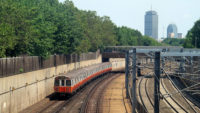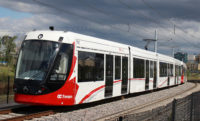Transit Infrastructure
Equipment Cart Derailments Delay MBTA Tunnel Repairs
Mishaps come amid federal safety review

A crew member cools down rail after track welding near Bowdoin Station on the MBTA's Blue Line.
Photo courtesy of the MBTA
Rail transit trains on the Boston-area's Blue Line began running again to Boston Logan Airport on May 18 following an accelerated repair project that ended up taking nearly twice as long as planned after a series of mishaps.
The Massachusetts Bay Transportation Authority (MBTA) shut down service between the Bowdoin and Logan stations on April 25, hoping to cram a year’s worth of repair work on a key stretch of the Blue Line into two weeks.
But on May 7, the day before trains were slated to resume running to Logan, a cart carrying tools and equipment for the project derailed, the MBTA now acknowledges after the incident was reported in The Boston Globe.
It was followed by another derailment of an equipment cart on May 8, followed by a third derailment the day after that.
Due to the three derailments, the MBTA and the contractor on the project, Railworks Track Services LLC, extended work on what was supposed to be a 14-day project by more than a week, from May 8 until trains resumed running on May 18.
“The resumption of service was delayed following the incidents with the carts carrying tools/equipment for the project,” said Joe Pesaturo, an MBTA spokesperson, in an email.
The aims of the estimated $7.5-million project were to improve protection against flooding in the Blue Line Harbor tunnel that links the Aquarium and Airport stations and also to replace tracks.
The bulk of the project, or roughly $5 million, involved replacing 1,800 ft of “full depth track.”
As work on replacing the old track with new track was going on, other crews were simultaneously undertaking inspections of the tunnel and drainage systems, as well as sealing leaks, installing fiber optic cables, upgrading tunnel lighting, removing abandoned cable and making signal repairs,” according to the MBTA. All told, the repairs cost another $2 million.
The accelerated work schedule, even as it took closer to 24 days than two weeks to accomplish, compressed what would have been a year’s worth of work on nights and weekends, shaving up to $3 million from the overall cost.
That would have involved “constantly mobilizing and demobilizing each night and each weekend” contractor crews, while also footing the bill for shuttle buses and other “transit operational support” needed to ferry passengers around the closed stations.
The Blue Line tunnel track replacement and repair work, in turn, is one part of the MBTA's $8-billion, five-year capital investment campaign, which includes everything from station renovations to new fare collection systems.
“The work accomplished during these closures will ultimately lead to better, safer, more reliable service for our Blue Line riders on a faster timeline,” said MBTA General Manager Steve Poftak, in a press release.
Still, the derailments, though they may have involved tool carts, come at a sensitive time for the "T." The authority is under scrutiny for a growing number of safety incidents, including one case involving a passenger who was killed trying to exit a Red Line, only to find his arm trapped in the door.
Federal Transit Administration Inspection
The Federal Transit Administration in April launched a “safety management inspection” of the MBTA. FTA informed the T it is “extremely concerned with the ongoing safety issue” and added that the FTA had already begun to take “an increased safety oversight role of the MBTA system,” State House News Service reported, citing the letter.
Meanwhile, the T’s handling of the news of the federal intervention, as well as the derailments of work carts during the Blue Line tunnel repairs, have raised concerns about a lack of transparency in the transportation agency’s dealings with the press and the public.
When the T announced the first delay in the completion of the tunnel repair and track replacement project on May 8, the agency did not mention that a derailment had occurred the day before, and on that day as well, the Globe reported.
When the MBTA announced the second delay on May 12, it failed to mention that there had been three derailments at that point.
Likewise, the federal safety review of the MBTA actually began in April, but was only recently acknowledged by the agency.
An MBTA spokesperson did not respond when asked, in an email, about criticism of how the agency handled the release of information on the derailments related to the Blue Line work.




